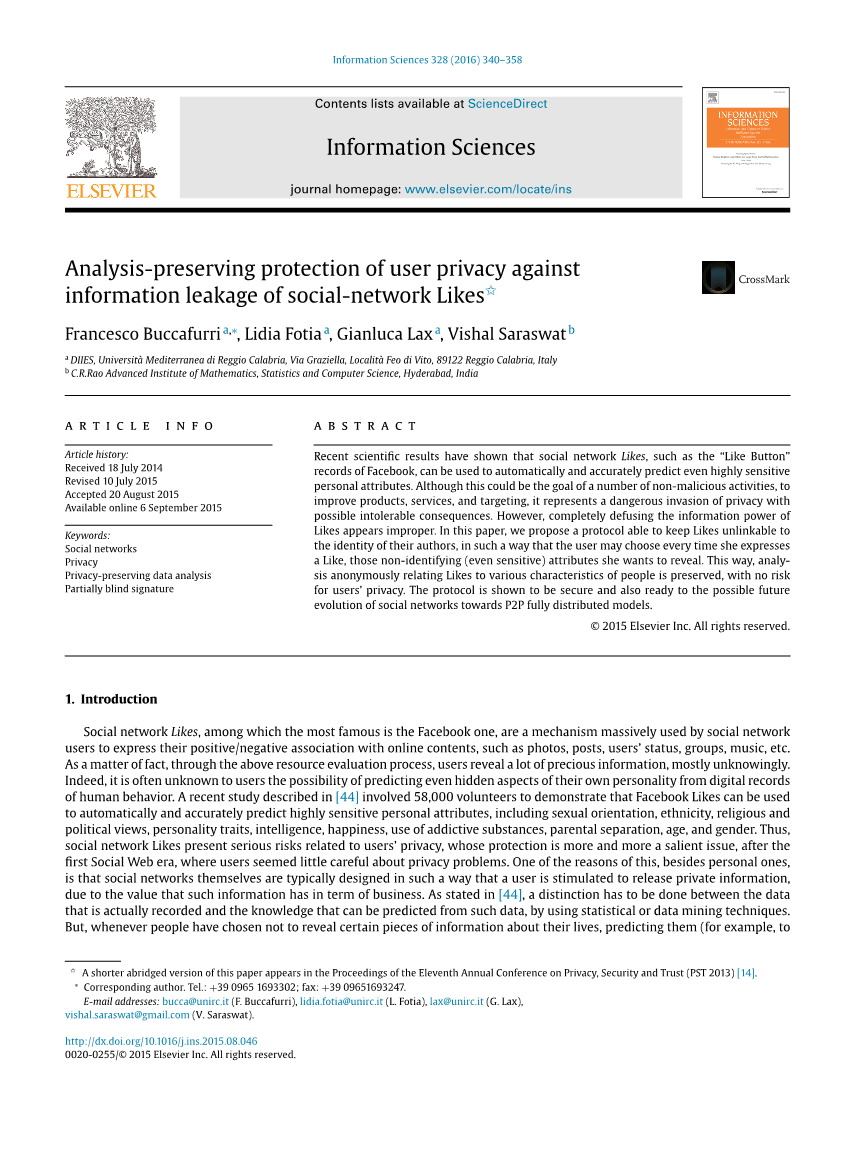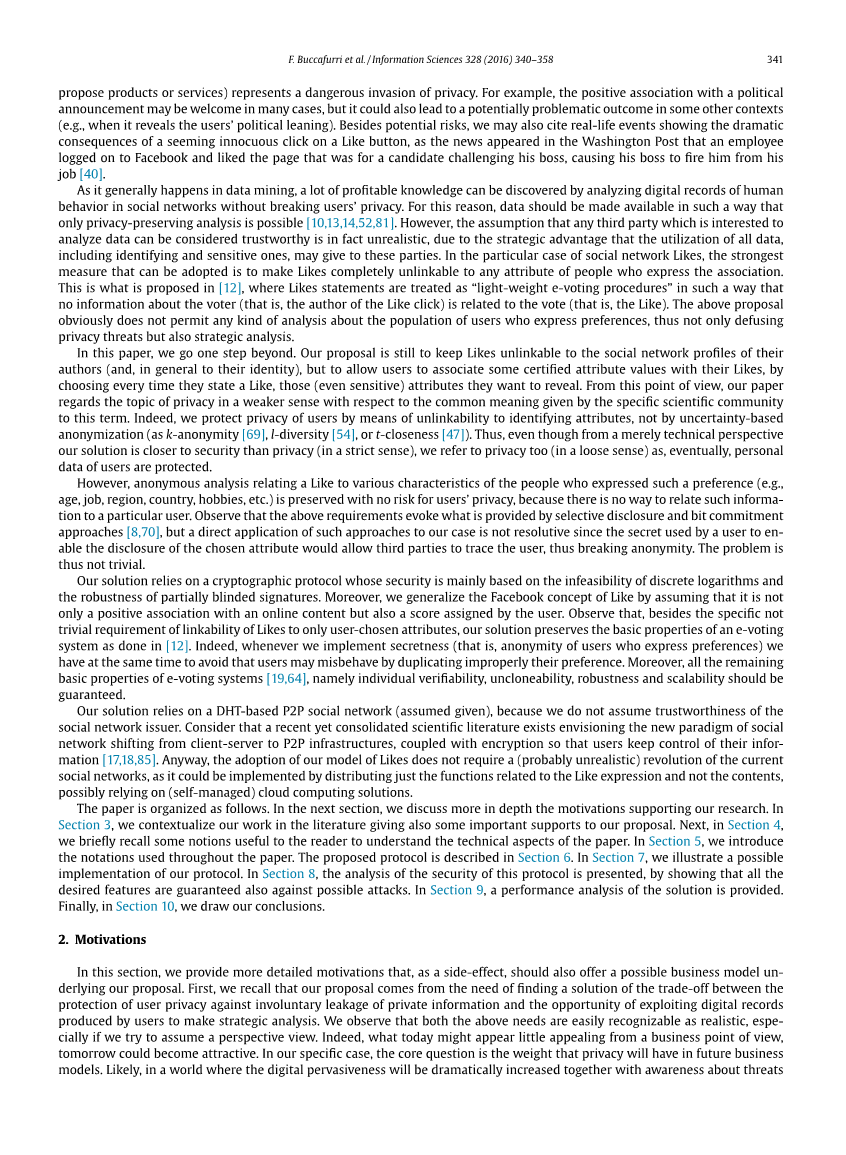

英语原文共 19 页,剩余内容已隐藏,支付完成后下载完整资料
目 录
英文原文
Analysis-preserving protection of user privacy against
information leakage of social-network Likes(节选)
Introduction
Social network Likes, among which the most famous is the Facebook one, are a mechanism massively used by social network users to express their positive/negative association with online contents, such as photos, posts, usersrsquo; status, groups, music, etc.As a matter of fact, through the above resource evaluation process, users reveal a lot of precious information, mostly unknowingly.Indeed, it is often unknown to users the possibility of predicting even hidden aspects of their own personality from digital records of human behavior. A recent study described in [44] involved 58,000 volunteers to demonstrate that Facebook Likes can be used to automatically and accurately predict highly sensitive personal attributes, including sexual orientation, ethnicity, religious and political views, personality traits, intelligence, happiness, use of addictive substances, parental separation, age, and gender. Thus, social network Likes present serious risks related to usersrsquo; privacy, whose protection is more and more a salient issue, after the first Social Web era, where users seemed little careful about privacy problems. One of the reasons of this, besides personal ones, is that social networks themselves are typically designed in such a way that a user is stimulated to release private information, due to the value that such information has in term of business. As stated in [44], a distinction has to be done between the data that is actually recorded and the knowledge that can be predicted from such data, by using statistical or data mining techniques. But, whenever people have chosen not to reveal certain pieces of information about their lives, predicting them (for example, to propose products or services) represents a dangerous invasion of privacy. For example, the positive association with a political announcement may be welcome in many cases, but it could also lead to a potentially problematic outcome in some other contexts (e.g., when it reveals the usersrsquo; political leaning). Besides potential risks, we may also cite real-life events showing the dramatic consequences of a seeming innocuous click on a Like button, as the news appeared in the Washington Post that an employee logged on to Facebook and liked the page that was for a candidate challenging his boss, causing his boss to fire him from his job [40].
As it generally happens in data mining, a lot of profitable knowledge can be discovered by analyzing digital records of human behavior in social networks without breaking usersrsquo; privacy. For this reason, data should be made available in such a way that only privacy-preserving analysis is possible [10,13,14,52,81]. However, the assumption that any third party which is interested to analyze data can be considered trustworthy is in fact unrealistic, due to the strategic advantage that the utilization of all data, including identifying and sensitive ones, may give to these parties. In the particular case of social network Likes, the strongest measure that can be adopted is to make Likes completely unlinkable to any attribute of people who express the association. This is what is proposed in [12], where Likes statements are treated as “light-weight e-voting procedures” in such a way that no information about the voter (that is, the author of the Like click) is related to the vote (that is, the Like). The above proposal obviously does not permit any kind of analysis about the population of users who express preferences, thus not only defusing privacy threats but also strategic analysis.
In this paper, we go one step beyond. Our proposal is still to keep Likes unlinkable to the social network profiles of their authors (and, in general to their identity), but to allow users to associate some certified attribute values with their Likes, by choosing every time they state a Like, those (even sensitive) attributes they want to reveal. From this point of view, our paper regards the topic of privacy in a weaker sense with respect to the common meaning given by the specific scientific community to this term. Indeed, we protect privacy of users by means of unlinkability to identifying attributes, not by uncertainty-based anonymization (as k-anonymity [69], l-diversity [54], or t-closeness [47]). Thus, even though from a merely technical perspective our solution is closer to security than privacy (in a strict sense), we refer to privacy too (in a loose sense) as, eventually, personal data of users are protected.
However, anonymous analysis relating a Like to various characteristics of the people who expressed such a preference (e.g., age, job, region, country, hobbies, etc.) is preserved with no risk for usersrsquo; privacy, because there is no way to relate such information to a particular user. Observe that the above requirements evoke what is provided by selective disclosure and bit commitment approaches [8,70], but a dir
剩余内容已隐藏,支付完成后下载完整资料
资料编号:[263624],资料为PDF文档或Word文档,PDF文档可免费转换为Word
以上是毕业论文外文翻译,课题毕业论文、任务书、文献综述、开题报告、程序设计、图纸设计等资料可联系客服协助查找。


